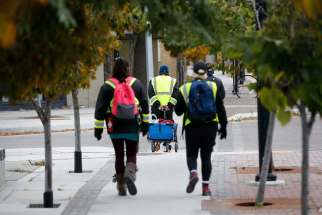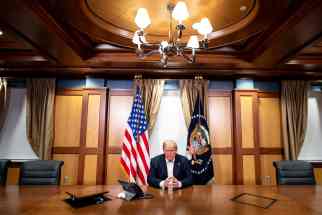Pandemic provides cover for human rights abuses
Read this article for free:
or
Already have an account? Log in here »
To continue reading, please subscribe:
Monthly Digital Subscription
$0 for the first 4 weeks*
- Enjoy unlimited reading on winnipegfreepress.com
- Read the E-Edition, our digital replica newspaper
- Access News Break, our award-winning app
- Play interactive puzzles
*No charge for 4 weeks then price increases to the regular rate of $19.00 plus GST every four weeks. Offer available to new and qualified returning subscribers only. Cancel any time.
Monthly Digital Subscription
$4.75/week*
- Enjoy unlimited reading on winnipegfreepress.com
- Read the E-Edition, our digital replica newspaper
- Access News Break, our award-winning app
- Play interactive puzzles
*Billed as $19 plus GST every four weeks. Cancel any time.
To continue reading, please subscribe:
Add Free Press access to your Brandon Sun subscription for only an additional
$1 for the first 4 weeks*
*Your next subscription payment will increase by $1.00 and you will be charged $16.99 plus GST for four weeks. After four weeks, your payment will increase to $23.99 plus GST every four weeks.
Read unlimited articles for free today:
or
Already have an account? Log in here »
Hey there, time traveller!
This article was published 05/10/2020 (1890 days ago), so information in it may no longer be current.
It is becoming increasingly apparent that human rights can rightly be counted among the casualties of the global pandemic.
Consider, for example, Amnesty International’s announcement last week that it has been forced to cease operations in India, after Prime Minister Narenda Modi froze the global human rights organization’s bank accounts. The move was widely seen as the most recent element in a longer campaign to limit the presence and influence of non-governmental organizations whose missions conflict with Mr. Modi’s attempts to forge a more totalitarian regime.
There is reason to believe Mr. Modi’s government would have moved to cripple Amnesty International and other non-profits even if the pandemic had not arrived earlier this year; he has earned international rebukes for his assault on human rights in India. However, it is becoming increasingly evident the pandemic is providing convenient cover for some of the greatest enemies of democracy and human rights.
Although pandemic-related human rights abuses are more acute in developing countries, Freedom House reported they also exist in developed countries, most notably the United States.
A new report by Freedom House, one of the oldest and most respected global human rights agencies, assesses the state of human rights in the age of COVID-19. Based on hundreds of interviews with journalists, civil rights advocates and an assessment of events in 192 countries, it concludes that human rights have diminished in at least 80 countries since the pandemic arrived.
As an example, Freedom House highlighted its concerns about the situation in Sri Lanka, where Prime Minister Mahinda Rajapaska has ramped up efforts to limit independent journalism and free speech with a series of arrests of anyone critical of the government’s response to COVID-19. An election planned for earlier this year was postponed indefinitely, giving Mr. Rajapaska’s government unchecked executive powers.
Although pandemic-related human rights abuses are more acute in developing countries, Freedom House reported they also exist in developed countries, most notably the United States.
In addition to the repeated lethal use of force by police against people of colour, many Americans are watching in horror as U.S. President Donald Trump launches an unbridled attack on the integrity of the upcoming presidential election. Human rights advocates have argued that Mr. Trump’s attempts to de-legitimize the result has the potential to trigger a new generation of voter-identification — measures of the sort that, in past elections, have disenfranchised a disproportionate number of voters of colour.
The Freedom House report is also critical of governments, once again including the U.S., that have politicized pandemic responses. Mr. Trump and other members of the Republican Party have launched vitriolic attacks against Democratic mayors and governors, blaming them for the spread of COVID-19 and Black Lives Matter protests. The result is that simple virus-mitigation tools, such as the wearing of masks, have become politicized and are central to a divisive and deeply entrenched public rancour.
If there is hope to be found in what appears to be a rather hopeless situation, it is that the citizens of these countries do not appear ready to give up the fight for their human rights. In many countries, ongoing pro-democracy and civil-rights protests serve as a reminder that, even if most of the world is not watching, many citizens still are. And they are not prepared to allow democracy to go down without a fight.
“Democracy is suffering around the world,” the Freedom House report stated, “but the public’s demand for it has not been extinguished.”




